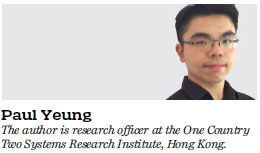AI era provides opportunity to rethink welfare policies
Updated: 2018-08-09 07:30
By Paul Yeung(HK Edition)
|
|||||||||
While the coming Artificial Intelligence era will bring a great challenge to the job market, it will also create an opportunity for widespread changes in social welfare policies. In some countries, for example, the idea of introducing a robotics tax is being discussed as a way to mitigate the impact of advancements in AI development and deployment on the labor market.
One of the most eye-catching ideas is the introduction of a basic income for all citizens, which means a universal, guaranteed regular amount of money from a public source. It is hard to imagine that such a blanket welfare policy would be implemented in Hong Kong. But is it really just a fantasy? Let's study a similar case: the statutory minimum wage.
When the idea of implementing a minimum wage was first put forward, the concept of a basic income was also discussed as an alternative. The main reason for eventually choosing the former was that it was a better policy for Hong Kong's productivist welfare regime.
The features of the minimum wage related to the productivist regime are evident in its policymaking process. The Provisional Minimum Wage Commission, responsible for the initial formulation of the minimum wage, was bound by a set of terms of references, consisting of four terms, which are highly relevant to economic aspects of the minimum wage, while the social, i.e., welfare, aspects are overlooked.

By this initial setting, it is not hard to observe that the minimum wage in Hong Kong, to a certain extent, subordinates social policy to economic policy. The mechanism for determining the minimum wage suggested by PMWC put a strong emphasis on economic growth and competitiveness. PMWC develops a basket of 12 indicators for consideration in setting the wage. The indicators are overwhelmingly economic; only three concern the well-being of workers. A wage floor, not a living wage, is used as the basis of the minimum wage. While this policy guarantees a minimum income, it doesn't mean it will necessarily be sufficient to meet a family's expenses.
While PMWC uses a wage floor as its basis, it should be noted that the minimum level is set at not less than that provided under the Comprehensive Social Security Assistance scheme. This is meant to create an incentive to work, and to accord due dignity to employees.
PMWC also adopted a criterion under the concept of the living wage, which is the average monthly unemployment payment under CSSA. PMWC considered that the minimum wage should be able to entice people to leave the social security net. The role of the policy as a disincentive for people to remain on the assistance program and to reduce the public expenditure burden is highly weighted. Hence, the scope of welfare is extended when it is linked to productive activity. Social welfare burden is shifted to the market by ensuring a wage floor provided by the private sector, while at the same time economic growth is put into serious consideration.
Enhancing work incentive is put as high priority in the policy design. It is suggested that if work incentives can be enhanced, individuals who are originally economically inactive would be attracted to enter or re-enter the labor market. Furthermore, it is expected that if this additional supply can be fully absorbed by the labor market, the economy would benefit from the minimum wage as higher wages for the low-paid workers would induce higher consumption at the lower social and economic strata, which can in turn help generate further employment opportunities.
All in all, the case of the minimum wage had three implications. Firstly, the policy itself was full of controversy at the very beginning, but it was eventually introduced due to a strong public voice. Secondly, the plan is also part of the active labor market policy, aligned with the productivist welfare regime. Thirdly, when the welfare regime changes in the AI era, i.e., the concern for human productivity is not crucial, the policy of minimum wage will have a chance to change.
Ronald Reagan said: "Welfare's purpose should be to eliminate, as far as possible, the need for its own existence." When the social need changes, there is no reason for the social welfare policy to remain unchanged.
(HK Edition 08/09/2018 page8)